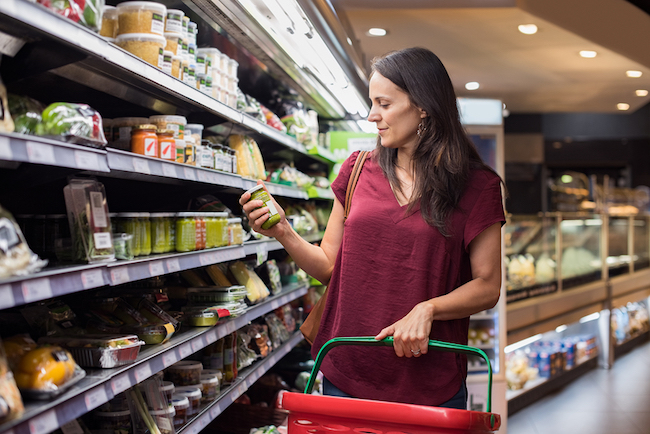
Farmland LP is Demonstrating How Converting Farmland to Organic Can be a Profitable and Very Beneficial Endeavor
(Above: Dormant blueberries with their pink bark in the foreground, hazelnuts in the background -- both from Nut Farm in Oregon. All photos courtesy of Farmland LP.)
Far too often, people are bombarded with the narrative that organic farming has much lower yields and is just not economically viable, leading them to conclude that growing GMOs is the only option.
Craig Wichner will tell you otherwise.
“We have demonstrated that sustainable agriculture is more profitable than chemically-dependent, conventional agriculture,” said the CEO of Farmland LP, an investment fund that converts conventional farmland to regenerative organic. “All of our land for organic vegetables is fully leased out, and even though we just increased the rent on our farmland from $700 to $750 per acre, our farmers have asked for longer leases, and we are oversubscribed. We need to buy more land to convert to organic because the demand is so great. This wouldn’t be happening if our farmers weren’t making money.”
Critical to Farmland LP’s success is that everything is done with the goal of maximizing the productivity of the soil. This means planting four different crops on the land per year and having a planned rotation of animals, vegetables, fruits and grains.
This approach would be quite challenging if you were one farmer on one fixed piece of land, not to mention all of the different equipment that would be required.
Yet, since Farmand LP controls 15,000 acres throughout California and Oregon, it can move farmers in and out of different farms, empowering them to be as successful as possible.
“We are doing multi-tenant commercial real estate on farmland and are replacing commodity crops with specialty and permanent crops, like grapes and blueberries, that command higher prices. This long-term crop rotation increases soil fertility, productivity and resilience,” said Craig Wichner. “When conventional farmers try to do organic and say that it doesn’t work, they are utilizing conventional techniques. For organic to work, you have to do crop rotation and rehabilitate the soil.”
Farmland LP, which has $200M of farmland under management, knows that its approach is successful, having delivered 10% annualized returns with 1/3rd leverage.
With this track record and ability to attract patient investors, it is afforded the opportunity to put its farms through the three-year USDA organic conversion process and also identify the ideal crop rotation over the next 10 years.
MISSION DRIVEN
For Craig Wichner, the motivation behind this fund is clear.
When his daughter was born, he believed that today’s generation is leaving behind a planet in difficult shape and that he was going to dedicate his life to allow for her dreams to come true. And he asked himself what he was doing to make a difference, something that he spent two years exploring.
With the fund, not only is he increasing organic farmland in the U.S., but he is taking square aim at the millions of acres of GMO corn and soy that are planted each year.
“Monocroppping is incredibly harmful to current and future generations. It poisons the water supply from the pesticides, destroys pollinators and decimates ecosystems in the Midwest. And it’s all subsidized by taxpayers,” put forth the fund’s CEO.
Thanks to a grant from the USDA’s Natural Resource Conservation Service, Farmland LP was able to quantify the ecological benefits of its sustainable agriculture practices using Ecosystem Service Valuation and Greenhouse Gas accounting models on a field-by-field basis.
Its first fund generated $12.9 million in ecosystem service value since inception — a significant benefit that accrues to the surrounding communities and environment. Under conventional management practices, these same farms would have caused $8.5 million in ecosystem harm since inception, resulting in a total $21.4 net ecosystem service value benefit as compared to conventional practices.
This benefit was generated on $85 million of farmland and is on top of the 67% net financial gain in the fund — a true double-bottom line investment return.
KEY TAKEAWAY
Farmland LP allows individuals and institutions to invest in the conversion of farmland to organic, an incredibly important endeavor for our industry, especially since we are forced to rely on imports for the majority of our organic food needs.
Yet, there is a critical lesson in how this fund operates.
By taking a holistic approach of having land management and organic farming work separately but in unison — all with the shared goal of maximizing soil productivity — it can achieve the best possible result.
“Soil biology is fundamental to making the world a better place, for both increased profits and impact,” said Craig Wichner.
 Pinot Noir grapes, shown nearly ripe, at Massey Wells Farm near Buena Vista, OR.
Pinot Noir grapes, shown nearly ripe, at Massey Wells Farm near Buena Vista, OR.
 Frank Savage, Farm Manager, showing the cattle on pasture at Burns Farm near Tracy, CA.
Frank Savage, Farm Manager, showing the cattle on pasture at Burns Farm near Tracy, CA.
 Organic tomatoes are ready for harvest in late August at Brentwood Creek Farm in California.
Organic tomatoes are ready for harvest in late August at Brentwood Creek Farm in California.
 An organic annual ryegrass crop vigorously sprouting near Corvallis, OR.
An organic annual ryegrass crop vigorously sprouting near Corvallis, OR.
 At Brentwood Creek Farm, the farm crew is planting 2,700 ft of native hedgerows to promote native pollinators.
At Brentwood Creek Farm, the farm crew is planting 2,700 ft of native hedgerows to promote native pollinators.
 |
With gratitude, 
Max Goldberg, Founder |
Quick Hits
* E3Live has signed a marketing agreement with Eversea, producer of the world’s first certified organic omega-3 DHA — from algae.
* Red Belly Honey — which feeds its bees full-spectrum hemp — is now available for sale at all Erewhon locations.
* In Ghana, Dr. Bronner’s has partnered with Ecosia to purchase and convert 200 acres to regenerative organic agroforestry for the planting of cocoa and palm trees.
* From April 11-25, Thrive Market and RangeMe are holding The Retail Sustainability Collaborative initiative, an initiative that allows brands to efficiently submit emerging sustainable products for consideration on Thrive Market.
* For Earth Month, Forager Project is unveiling limited-edition packaging “Eat Organic Vegan Food & Help Save Our Planet” on its spoonable cashewmilk yogurts.
* General Mills is investing $15M in funds for minority and female entrepreneurs.
* StartOrganic’s online and in-person corporate gardening program is helping to reduce stress for 92% of its participants.
* Rumiano Cheese Company has transitioned to a 100% organic food brand.
* Anna in the Raw, which is the go-to pressed organic juice bar for professional athletes in Cleveland, just re-opened at a new location.
* Regeneration Nation is selling a limited-edition, certified organic cotton hoodie, and a part of the proceeds will go to Rodale Institute.
* A non-profit in Washington has donated 8,900 pounds of organic fruits and vegetables grown in a school garden.
New Organic Products
Regenerative Sunflower Seed Oil from Flamingo Estate
In partnership with La Tourangelle, Flamingo Estate has harvested and bottled regenerative organic sunflower seed oil to benefit the Sunflower of Peace Foundation -- an organization helping Ukrainian families affected by the ongoing Russian military invasion. Every dollar from this purchase will go to the Foundation, and Flamingo Estate will match the donation, so each bottle purchased results in $70 to the Sunflower of Peace Foundation.Revitalizing Tea Tonics from Urban Remedy
Created by company founder Neka Pasquale, an acupuncturist and herbalist, the organic Revitalizing Tea Tonics from Urban Remedy have a low sugar profile and offer functional wellness benefits, with ingredients such as aloe, ginger, rosehips, orange peel and lemongrass. Available in three flavors -- grapefruit turmeric, peach ginger probiotic and strawberry hibiscus rose.Moon Milks from Clover Sonoma
Clover Sonoma has just released a first-of-its-kind dairy beverage -- Organic Moon Milks. Steeped in ancient Ayurveda, the Moon Milks blend two percent organic milk, herbs and spices. Available nationally at Whole Foods Market, the product comes in three flavors: Golden Moon (turmeric ginger), Blue Moon (blueberry lavender) and Pink Moon (cherry berry hibiscus).Junior Pops from GoodPop
GoodPop has unveiled organic Junior Pops, which are 100 percent fruit juice-based and made with no added sugar. The pops come in three different flavors -- orange, cherry and grape -- and they are now available on the company's website, in addition to Whole Foods Market, Sprouts and H-E-B stores nationwide.
Weekly News Summaries


Survey: Specific Claims, Such as 'Cruelty-Free,' are More Effective than USDA Organic Label
By Chris Casey
Some very discouraging truths about how the organic label is viewed by consumers.
Grocers are Pulling Amy's Kitchen Products from the Shelf, Boycotting the Brand
By Lauren Saria
I wonder how long it takes before B Corp does anything.

Indian Minister: "Organic Food Can Transform Our Economy"
Indian leaders are very astute when it comes to recognizing the importance of organic food.


Big Ag is Printing Children’s Books That Say Pesticides are Great
A publishing company linked to the most powerful agricultural lobby group in the U.S. is releasing children’s books extolling the benefits of pesticides and nitrogen fertilizers.
How to Read a Food Label: A Healthy Skeptic’s Guide to the Buzzwords
By Elizabeth G. Dunn
Great to see the Regenerative Organic Certified and Real Organic Project logos prominently featured in The Wall Street Journal.

California Oil Wastewater -- Sprayed on Crops -- is Safe?
By Liza Gross
A California water board assures the public that oil wastewater is safe for irrigation, but experts say the evidence is scant.


Mid-Day Squares raises $10M Series C
By Monica Watrous
The company is on track to generate $17 million in revenue this year and $36 million in 2023.

For the 7th Year in a Row, Strawberries top the List for EWG's Dirty Dozen
By Andrea Michelson
Nearly 70% of non-organic produce tested had detectable pesticide residue, usually at levels that fell within the legal limits in the U.S.

Op-ed: Fake Meat Won’t Solve the Climate Crisis
By Philip H. Howard
A new report questions the dramatic environmental claims that alternative proteins can save the planet, disrupt the status quo or challenge the power of the corporate food industry.
Want to share this newsletter on social media? You can use this link: Newsletter Link
The material in this newsletter is copyrighted and may be reprinted by permission only. All requests must be in writing. Please use our contact form to request republication rights.
Newsletter Archive
Quick Hits
* E3Live has signed a marketing agreement with Eversea, producer of the world’s first certified organic omega-3 DHA — from algae.
* Red Belly Honey — which feeds its bees full-spectrum hemp — is now available for sale at all Erewhon locations.
* In Ghana, Dr. Bronner’s has partnered with Ecosia to purchase and convert 200 acres to regenerative organic agroforestry for the planting of cocoa and palm trees.
* From April 11-25, Thrive Market and RangeMe are holding The Retail Sustainability Collaborative initiative, an initiative that allows brands to efficiently submit emerging sustainable products for consideration on Thrive Market.
* For Earth Month, Forager Project is unveiling limited-edition packaging “Eat Organic Vegan Food & Help Save Our Planet” on its spoonable cashewmilk yogurts.
* General Mills is investing $15M in funds for minority and female entrepreneurs.
* StartOrganic’s online and in-person corporate gardening program is helping to reduce stress for 92% of its participants.
* Rumiano Cheese Company has transitioned to a 100% organic food brand.
* Anna in the Raw, which is the go-to pressed organic juice bar for professional athletes in Cleveland, just re-opened at a new location.
* Regeneration Nation is selling a limited-edition, certified organic cotton hoodie, and a part of the proceeds will go to Rodale Institute.
* A non-profit in Washington has donated 8,900 pounds of organic fruits and vegetables grown in a school garden.




